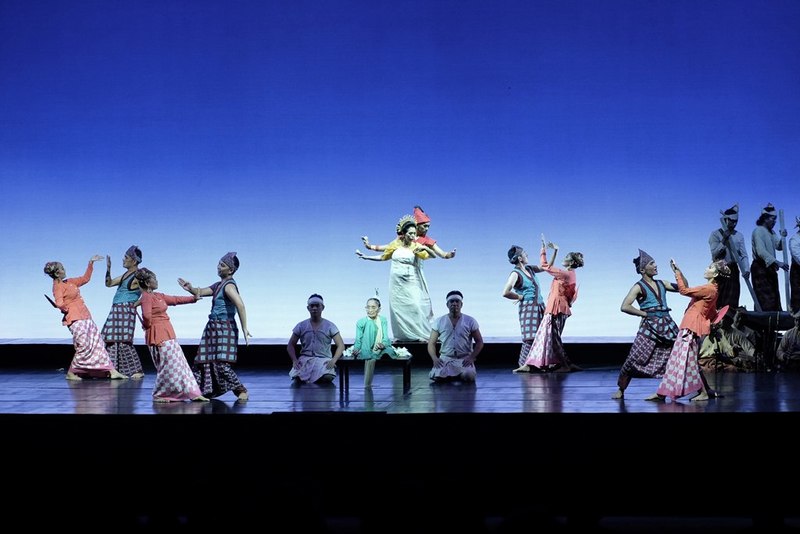A world-class music theatre I La Galigo returns to Jakarta in July, featuring the nation’s priceless ancient literature.A world-class music theatre I La Galigo returns to Jakarta in July, featuring the nation’s priceless ancient literature.

“I La Galigo” premiered at the Esplanade Theatre on the Bay, Singapore in 2003 and earned praise during tours in prestigious venues across the globe, including Lincoln Center New York, Het Muziektheater in Amsterdam, Forum Universal de les Cultures in Barcelona, Les Nuits de Fourviere in Rhone, France, Ravenna Festival in Italy, Metropolitan Hall for Taipei Arts Festival, Melbourne International Arts Festival and Teatro Arcimboldi in Milan before returning home for a performance at Fort Rotterdam in Makassar in 2011.
Last year, during the Annual Spring Meetings of the International Monetary Fund-World Bank Group in Bali, the theatrical piece was performed for four nights on a specially constructed stage in Nusa Dua’s Peninsula area.
The original production received a remarkable reception and reviews from both theater-goers and critics. The New York Times called it “…a stunningly beautiful music-theater work…” when it opened at the Lincoln Center Festival in 2005.
In Jakarta, the performance in 2005 took place at Taman Mini Indonesia Indah. Thanks to Rina Ciputra Sastrawinata, the President Director of Ciputra Artpreneur who collaborated with Bumi Purnati Foundation which produced the world-class theatre, it will be performed again from 4 to 7 July in Ciputra Artpreneur Theatre.
“I La Galigo” is a Bugis folktale adapted into a musical theatre performance by Robert Wilson who was inspired by Sureq Galigo or La Galigo, epic poems of the indigenous Bugis people in South Sulawesi that tells about the origin of the community. The poem, which is enshrined in UNESCO’s Memory of the World because it contains the world’s collective literature and memory, is a very long epoch, from the past. It evolved mostly through oral tradition—and is still sung on important occasions— manuscripts and recorded in the form of poems, during the 13th and 15th centuries, in ancient Bugis language lontara (ancient Bugis letters).

La Galigo is Indonesia’s largest artwork. The story began before the 13th century. It’s unclear who the author was. This folktale had spread throughout South Sulawesi in more developed versions. The earliest preserved written versions date back to the 18th century, earlier ones have been lost due to insects, climate or destruction. Consequently, there’s no complete or definite version. The La Galigo preserved parts of script which stored in the KITLV Leiden amount to 6,000 pages or 300,000 lines of text, making it on of the largest works of literature which does not include other ancient manuscripts or oral stories.
La Galigo is not a historical text, the contents are full of myths and extraordinary occurrences. However, this epic still gives historians an overview of Bugis culture before the 14th century. The original version is in the Galigo Bugis language, which can only be understood by less than 100 people. Only a portion of Galigo has been translated into the Indonesian. There are no English translations.
Rhoda Grauer, a producer and playwright who was responsible for the text adaptation and dramaturgy of “I La Galigo”, has done a great job of condensing the large text into a manageable adaptation for stage.
“I La Galigo” is a two-hour theater performance and actors are mostly second-generation players. 13 members of the troupe were part of the original cast. The main character of Sawerigading is played by Gentille Andilolo, an artist from Toraja, South Sulawesi who is also a teacher of performing arts. Sawerigading is a Luwu king’s son of Luwu Purba kingdom, described as a hero, nomadic and a tough captain who falls in love with his twin-sister We Tenriabeng. Because marriage to a blood relative is believed to bring disaster, Sawerigading then migrated to China by boat and met We Cudaiq, (played by Sri Qadariatin),whom he marries and has three children with. One of them is La Galigo. La Galigo is not much different from his father, recognised as a tough captain and always triumphant overseas. La Galigo has four wives from various countries and a child named La Tenritatta who later becames King of Luwu.
The greatness of the epic of “La Galigo” has a profound influence on history in the days of the feudal kingdoms in power. Later, Luwu as the place for the descent of the Batara Guru (great teacher) was considered as a sacred area by both Makassar and Bugis rulers in South Sulawesi. Believed by many in the past, the powerful kings of South Sulawesi were descendants from that region.

In the stage adaptation, Sureq Galigo forms the basis of a story that describes adventures, warfare, forbidden love stories, complex wedding ceremonies, and betrayal. “I La Galigo” is a plot that forms a big story which is dynamic, interesting and is relevant to modern life. The performance is divided into two big parts, initial cosmological stories which tells the origin of human presence on earth and the second part is about the status system which is very important for Bugis people’s social life.
The performance will be on a state-of-the-art stage and lighting technology which promises to spectacular. The music will be composed by prominent Indonesian artist Rahayu Supanggah who is for creating a musical repertoire that integrates hauntingly beautiful compositions with chanting of certain parts of the epic poem.







